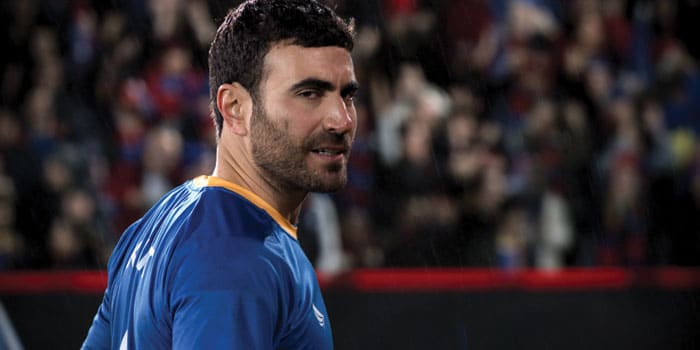 Brett Goldstein as Roy Kent in “Ted Lasso”
(Photo courtesy Apple TV+)
Brett Goldstein as Roy Kent in “Ted Lasso”
(Photo courtesy Apple TV+) Actor Brett Goldstein knows what it takes to reach for his dreams. He’s currently living them on the Apple TV+ show “Ted Lasso” as a co-star and writer. The show is about an American football coach, Ted Lasso (played by Jason Sudeikis), who is hired to coach a professional soccer team in England, with no prior soccer experience on his resume.
The show has become a massive success and earned 20 Emmy nominations, a new record for a show in its first year of eligibility.
Coach Lasso’s longest-tenured player is a surly, foul-mouthed veteran named Roy Kent, played by Goldstein.
Throughout the show, now in its second season, Roy is faced with the reality that his career as a professional athlete is coming to an end. And for his performance, Goldstein is nominated for a Primetime Emmy for Supporting Actor in a Comedy Series.
While growing up in Sutton, England, Goldstein’s original dream was to become a stuntman. But he can trace his initial inspiration to spend his life acting and writing to a conversation he had with his father around age six.
“I wrote a story about a shipwreck for school,” Goldstein said on Backstage magazine’s “In the Envelope” podcast. “My dad said to me, ‘You know that’s a job, being a writer, you can do that as a job.’ I remember thinking ‘Great, that sounds fun!’”
For many years, Goldstein, now 41, wrote and performed in plays, and eventually started doing standup comedy. Looking back at his younger years, Goldstein described himself as someone who was always “on the outside looking in.” He felt a point of view that ached to be heard and understood. And he had a career in writing and acting to keep pursuing.
After years of auditioning and acting in various roles on stage, TV and film, Goldstein was offered a writer position for the first season of “Ted Lasso.” During the nascent days in the writers room, before the show was filmed, Goldstein felt a connection to one of the characters being created: Roy Kent. As the character of Roy developed more, Goldstein realized he needed to play him.
“I’ve never felt as strongly about a part in my life,” he said.
So Goldstein shot a video of five scenes of himself performing as Roy. He felt that he was breaking a taboo—being a writer attempting to insert himself into the casting process. But he took a chance.
“I sent an email and said, ‘Look, if this makes you uncomfortable or this video is rubbish, please pretend you never got it and I will never ask,’” Goldstein wrote. “‘However, I think I can play Roy.’”
Sure enough, he got the part. Even after its second season, Goldstein still sees part of himself in the character of Roy.
“I see the sadness,” Goldstein said. “You do this thing [playing soccer] that is incredible and at some point, whether you like it or not, you can’t do it anymore and that’s tragic. And I understood the tragedy of Roy in that area.”
Anger billows inside Roy as he resents the youth of his AFC Richmond teammates and the chipper attitude of Coach Lasso. Much of the humor in Goldstein’s character stems from his inability to calmly express his emotions, resulting in hair trigger outbursts of F-word variations. Goldstein describes Roy as a cauldron of feelings who lacks the ability to articulate what he’s feeling.
Roy doesn’t blow up from a place of cruelty, but rather frustration: with his aging body, the typical locker room quarrels and the culmination of his dream as a professional soccer player.
“I am that angry,” Goldstein said. “I keep it in to get by in life, but I totally can tap into that anger very easily.”
Roy is a complicated character who, behind the outbursts, has a whole career of triumph and failure that the viewer doesn’t get to see, but knows it’s there.
The difference between Goldstein and Roy is that Goldstein spends much time reflecting on his career and inspirations out loud. He does this by hosting a podcast with similar sentiments called Films to Be Buried With. Since 2018, Goldstein has been interviewing guests with the premise that they’re dead, and they must reflect on and discuss their life through the films that mean the most to them.
Even as he picks up numerous accolades for his performance as Roy, it doesn’t go to his head. He’s still that kid on the outside looking in.
In some ways, the podcast keeps him grounded. Even as he picks up numerous accolades for his performance as Roy, it doesn’t go to his head. He’s still that kid on the outside looking in.
“Fame, success and awards should never be the end,” he said. “The end should be, ‘Are you enjoying the making of the thing?’ Because the making of the thing, whatever level you’re at, if it’s a short film you’re making with friends or a massive Apple TV show, it’s still the same. You’re still creatively making the thing, and if that makes you happy, then you’ll be all set.”
Brian Fishbach is a music journalist in Los Angeles.























 More news and opinions than at a Shabbat dinner, right in your inbox.
More news and opinions than at a Shabbat dinner, right in your inbox.